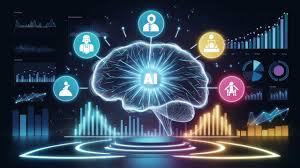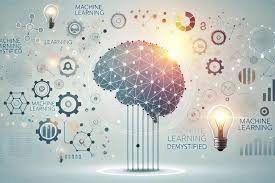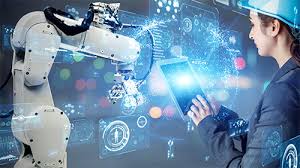Machine learning (ML) and artificial intelligence (AI) are no longer just buzzwords—they have become central to the evolution of various industries. As technology continues to advance, machine learning is unlocking new possibilities, optimizing processes, and transforming the way businesses operate. In this article, we will explore the rise of machine learning, its applications across industries, and the exciting future of AI-driven transformation.
What is Machine Learning?
Machine learning is a subset of artificial intelligence that allows computers to learn from data, identify patterns, and make decisions without being explicitly programmed. By leveraging algorithms and statistical models, machine learning systems can improve over time as they are exposed to more data.
In contrast to traditional programming, where humans write specific instructions for tasks, machine learning systems “learn” how to perform tasks by identifying patterns in large datasets. These models can then apply that knowledge to make predictions, automate processes, and even solve complex problems.
The Impact of Machine Learning Across Industries
Machine learning is not a one-size-fits-all solution. Its applications are vast and diverse, with industries ranging from healthcare to finance reaping its benefits. Let’s explore some of the major sectors where machine learning is making a significant impact.
1. Healthcare: Revolutionizing Patient Care
Machine learning has the potential to revolutionize healthcare by improving diagnostic accuracy, optimizing treatment plans, and streamlining administrative tasks. Some key applications include:
- Medical Imaging and Diagnostics: AI algorithms can analyze medical images (e.g., MRIs, X-rays, CT scans) to detect anomalies like tumors, fractures, and other conditions with high precision. These systems assist doctors in making faster and more accurate diagnoses.
- Predictive Analytics: By analyzing patient data, machine learning can predict the likelihood of diseases or complications, enabling preventive measures. It can also help doctors in determining the most effective treatments based on historical data.
- Drug Discovery: Machine learning speeds up the drug discovery process by analyzing vast datasets and identifying potential compounds for new medications. This helps pharmaceutical companies reduce time and cost in bringing new drugs to market.
2. Finance: Enhancing Security and Efficiency
In the financial sector, machine learning is used to detect fraud, optimize investments, and improve customer experiences. Key applications include:
- Fraud Detection: Machine learning models can analyze transaction data in real-time to identify suspicious patterns and detect fraudulent activity. By learning from historical data, these systems can flag anomalies and prevent losses before they occur.
- Credit Scoring: Traditional credit scoring models are often based on limited data. Machine learning, on the other hand, can incorporate a wider range of factors, such as spending habits and social media behavior, to provide a more accurate picture of an individual’s creditworthiness.
- Algorithmic Trading: Machine learning algorithms can analyze vast amounts of financial data to identify trends and patterns that humans might miss. These systems can make split-second decisions to buy or sell stocks, optimizing returns for investors.
3. Retail: Personalizing Customer Experiences
The retail industry is experiencing a massive shift as machine learning enables businesses to understand consumer behavior and deliver personalized experiences. Some applications include:
- Personalized Recommendations: Platforms like Amazon and Netflix use machine learning algorithms to recommend products and content based on previous purchases and viewing habits. This leads to better customer satisfaction and increased sales.
- Inventory Management: Machine learning can predict customer demand, allowing retailers to optimize inventory levels, reduce waste, and ensure that popular items are always in stock.
- Chatbots and Customer Service: AI-driven chatbots are capable of handling customer inquiries in real-time, offering instant support and freeing up human agents for more complex tasks.
4. Manufacturing: Improving Efficiency and Quality Control
Machine learning is transforming manufacturing by improving operational efficiency, quality control, and predictive maintenance. Key applications include:
- Predictive Maintenance: Machine learning algorithms can analyze data from machines to predict when they are likely to fail, allowing manufacturers to perform maintenance before costly breakdowns occur.
- Supply Chain Optimization: ML models can predict demand fluctuations and optimize production schedules to minimize costs and reduce delays in the supply chain.
- Quality Control: Automated inspection systems powered by machine learning can detect defects in products faster and more accurately than human inspectors, ensuring higher quality standards.
5. Transportation: Revolutionizing Mobility and Logistics
Machine learning is also reshaping the transportation sector, from autonomous vehicles to logistics optimization. Notable applications include:
- Autonomous Vehicles: Machine learning plays a crucial role in the development of self-driving cars. By analyzing data from cameras, sensors, and GPS, AI systems can navigate traffic, avoid obstacles, and make driving decisions in real-time.
- Route Optimization: Machine learning algorithms help logistics companies optimize delivery routes, reduce fuel consumption, and improve delivery times by analyzing traffic patterns and weather conditions.
- Predictive Maintenance for Vehicles: Similar to manufacturing, machine learning is used in transportation to predict when vehicles need maintenance, reducing the risk of breakdowns and improving fleet management.
The Future of Machine Learning: Trends and Innovations
The potential of machine learning is still far from being fully realized. As technology continues to evolve, we can expect even more transformative changes across various industries. Some emerging trends include:
- AI and Edge Computing: As more devices become connected through the Internet of Things (IoT), the need for real-time data processing is growing. Edge computing allows machine learning models to run directly on devices, reducing latency and improving efficiency.
- Explainable AI (XAI): One challenge with AI is the “black-box” nature of its decision-making process. Explainable AI aims to make machine learning models more transparent and interpretable, ensuring that humans can understand how decisions are made.
- Natural Language Processing (NLP): NLP is enabling machines to understand, interpret, and generate human language. This opens up new possibilities in areas such as virtual assistants, translation services, and sentiment analysis.
- AI Ethics and Bias Reduction: As machine learning models become more integral to decision-making, ensuring fairness and addressing biases in AI algorithms will be crucial. Ethical guidelines and unbiased data will be a focus for future AI research.
Conclusion: Embracing the Machine Learning Revolution
Machine learning is no longer a futuristic concept; it’s a present-day reality that’s transforming industries across the globe. From healthcare and finance to manufacturing and transportation, machine learning is improving efficiency, reducing costs, and enhancing customer experiences. As technology continues to advance, the potential applications for machine learning are limitless.
For businesses and individuals alike, embracing the power of machine learning is no longer optional—it’s essential for staying competitive in an increasingly data-driven world. By leveraging the power of AI, we can unlock new opportunities and drive innovation across every sector.
Keywords: machine learning, artificial intelligence, AI, industry transformation, predictive analytics, healthcare, fraud detection, algorithmic trading, autonomous vehicles, supply chain optimization, personalized recommendations, deep learning, natural language processing, predictive maintenance, machine learning applications, AI ethics, edge computing, machine learning trends, AI-powered solutions, future of AI, industry innovation, AI-driven transformation, ML models, machine learning algorithms, real-time data, explainable AI, business intelligence, machine learning in retail, machine learning in finance, AI in healthcare.




